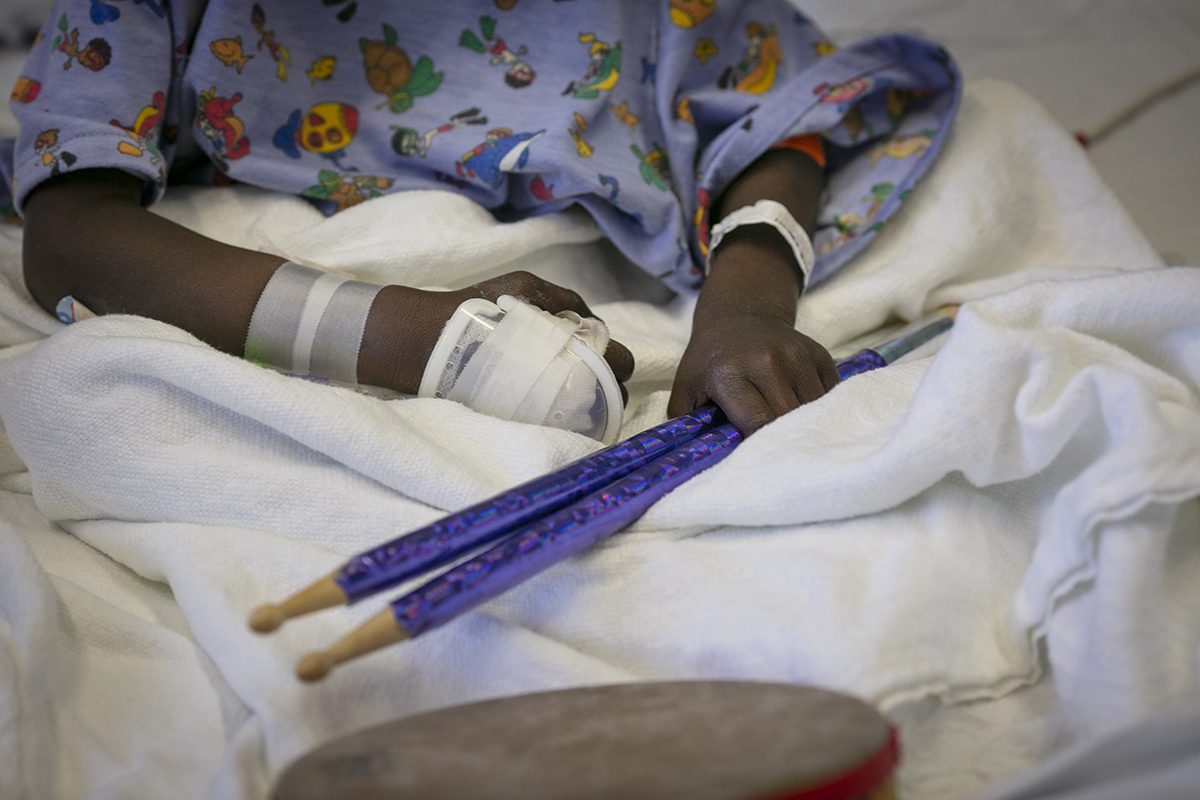
Dr. J Mack Slaughter Focuses on Healing the Spirit
The emergency room physician started Music Meets Medicine to give children with long-term illnesses a creative escape.
Dr. J Mack Slaughter ’09
TCU Major: Neuroscience
Medical Specialty: Emergency Medicine
The Nonprofit: Music Meets Medicine
January 2019 — Lyrics to a catchy pop tune and instrumentals reverberate down a hospital corridor in Dallas.
Why don’t you just meet me in the middle?
I’m losing my mind just a little.
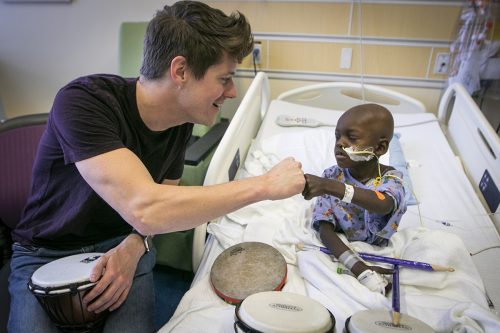
Dr. J. Mack Slaughter fist bumps with Daniel, 7, during a jam session at Children’s Medical Center in Dallas. Photo by Rodger Mallison
Dr. J Mack Slaughter, an emergency room physician with EMC of TeamHealth, plays a Taylor travel guitar alongside a young patient’s child-size hospital bed. Daniel, small and frail, is nearly swimming in a purple gown adorned with cartoon submarines and sea life.
Hannah Hankins, the boy’s nurse, finishes labeling vials of blood samples. “He’s been kind of grumpy because he hasn’t been able to eat,” she says. “This is perfect. Thank you all so much.”
Slaughter places a small electric drum set on the bed and hands Daniel the drumsticks. The boy starts tapping away. Compliments stream from Slaughter about Daniel’s prowess: “You’ve got natural rhythm, buddy.”
“Big finish!” Slaughter says in a crescendo. The duo seal the jam session with a fist bump. “Skidoosh!”
During the winter hospital visit at Children’s Medical Center Dallas, Slaughter was not on the clock. Rather, he was volunteering for Music Meets Medicine, the organization he created in 2008 that focuses on children’s hospitals in the Dallas-Fort Worth area. The nonprofit brings music to young patients with chronic illnesses using jam sessions, music lessons and financial donations.
“Through playing music for and with patients, you give them this escapism,” Slaughter said. “You give them this positive, uplifting course in the moment. Some people respond to it, and some people really respond to it.”
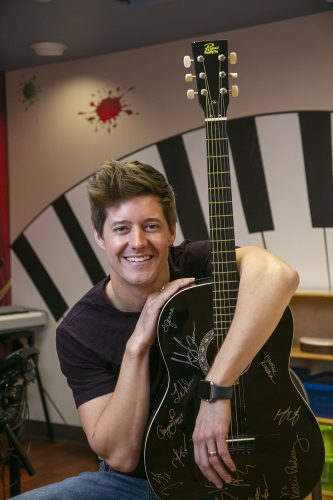
Dr. J Mack Slaughter is the founder of Music Meets Medicine, a nonprofit organization that donates instruments and provides music lessons to patients in children’s hospitals. Photo by Rodger Mallison
Music Meets Medicine funded a therapeutic arts room at Children’s Medical Center Dallas with Kidd’s Kids in memory of radio icon and Slaughter’s mentor Kidd Kraddick. Kidd’s Kids is another organization that focuses on aiding sick and physically challenged children.
“[Slaughter] was able to identify that need and then raise money to help patients who need a special place in the hospital that is safe, where they can go and express themselves,” said Lisa Jones, music therapist and the hospital’s therapeutic arts supervisor. “He was able to help fulfill that need.”
For Slaughter, the music therapy room, which officially opened in 2018, is important to complete the escapism. It gives the kids a chance to take a break from the challenges of treatment. “Anytime you experience it, you just know that it belongs.”
Music in hospitals has not always been welcome, Slaughter said, noting that history shows antibiotics and invasive surgeries are the favored routes. “All of those things are very necessary … but to ignore the social and the emotional aspects of being hospitalized, I think, is missing a crucial point in the healing process.”
But Slaughter said the tone is changing. “We are raised to our parents’ favorite music. We fall in love to music. People pass away, and we fall in love with certain songs,” he said. “All of our memories are so inextricably tied to all these musical memories, so why would we not also have that when we’re ill? It just makes sense.”
Slaughter’s first experience with music as escapism came during his mother’s chemotherapy treatment for stage 2 breast cancer. (She is now more than a decade into remission.)
A side effect of one infusion meant her fingers, toes and nails could turn black. To prevent this, she submerged them in ice for the duration of treatment — an hour. Constricting the blood flow to those vessels meant less of the drug would be delivered to the tips of her fingers and toes.
Ice may not sound problematic, but imagine the discomfort of the prolonged application of something frozen to a bump or bruise.
“My mom is strong-willed, and she would do it; she would just push through it,” Slaughter said. “She looked like she was in so much pain and agony, and we just hated it.”
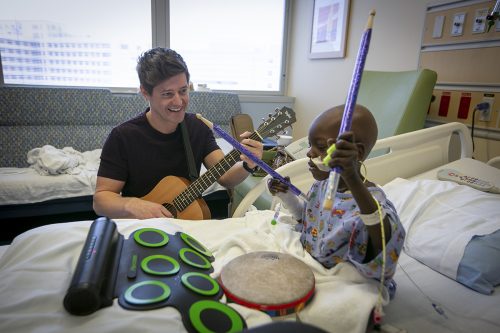
Dr. J Mack Slaughter accompanies Daniel, 7, as he rocks out on a drum set in his hospital room. Photo by Rodger Mallison
Slaughter and his sisters got together and tried to figure out what they could do. They went back to what they had done as children.
“We got our instruments. We brought them into the room, and we played for her,” Slaughter said. “That hour flew by. It was happy and loving and exciting. She was making requests. Next thing we knew, she was done.
“It was just so powerful to me after I experienced that that I knew I had to do something with it. I just felt called to do it. I didn’t know how. I didn’t know where and when.”
Slaughter linked his new perspicacity to the challenges of engaging chronically ill youth while volunteering at Cook Children’s Health Care System in Fort Worth as a TCU student. That eureka moment was the impetus for Music Meets Medicine.
The first big donation came from a group of Dallas doctors whom Slaughter met through his medical residency at UT Southwestern Medical Center. One doctor’s wife had breast cancer. Slaughter explained his nonprofit organization and asked if he could jam with her.
“It was that same power I experienced in the room with my mom. … After [the doctors] experienced that, they said they were on board,” Slaughter said, slapping the table. “They gave me a big check.”
* * * * *
“We have a limited amount of resources that we can dedicate toward consciousness — what we’re keenly aware of at any moment,” Slaughter said. “We’re blocking out a significant portion of that. … If you can capture somebody’s consciousness and pull it over to you and what you’re doing, they can’t mentally be focused on the pain and the negative aspects of the treatment.”
Slaughter remembered an oncology patient at Children’s Medical Center Dallas with whom he had weekly jam sessions. The physician gave the boy a guitar, a mini amplifier and a set of headphones.
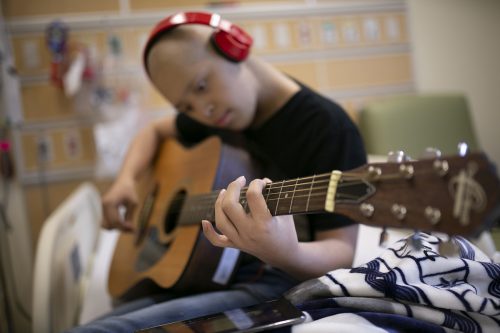
Uriel, 15, practices guitar in his room at Children’s Medical Center Dallas. The guitar was donated to the hospital by Music Meets Medicine, a nonprofit founded by Dr. J Mack Slaughter. Photo by Rodger Mallison
“He was getting really good at guitar,” Slaughter said. “It was becoming a part of who he was.” The boy was receiving aggressive treatment for the cancer in his leg, which eventually had to be amputated below the knee.
“The night before they amputated, his mom told us he was playing guitar all night long,” Slaughter said. “It went from giving someone escapism in the moment to teaching them how to cope on their own. That’s when you feel like you really can make a leap in music therapy — is giving them the tools.”
Jones, the music therapist, agrees. “It makes you feel good that music is being used in that way and that patients who are having such difficult times in the hospital can have that outlet.”
A strong benefit of music therapy, Slaughter said, is that it helps kids process what they’re going through, their own mortality. Though Music Meets Medicine does not tackle this, Slaughter said the organization supports those efforts.
Jones’ music therapists focus on helping children with the psychosocial ramifications of hospitalization. The team uses musical intervention activities as tools in the therapeutic process.
Lyric analysis and active music-making aid the formation of relationships and therapeutic bonds, and therapy can proceed from there.
Raymond Turner, recording studio producer at Cook Children’s, has seen Slaughter’s organization in action, including a recent visit to the neonatal intensive care unit. During that visit, Caroline Kraddick, Kidd Kraddick’s daughter and CEO of Kidd’s Kids, held and sang to babies as Slaughter accompanied her on the guitar.
“Recalibrating is the word that keeps coming back to me,” said Turner, who stayed in a neonatal intensive care unit as a premature infant. “Seeing what they were doing in that moment — they were giving something that that child could not express gratitude for. It was almost this act of grace.
“Seeing them do that and realizing it’s not about performing — it’s not about doing that so someone can clap and applaud or get kudos for, but singing to someone who will probably never know that happened,” Turner said. “[It’s] getting back to the heart of it and what music really means and its ability to, in a sense, heal.”
Looking forward to more collaborations with Slaughter, Turner said, “Just spending even a minute around him is infectious. His passion for not only music but also medicine and to bring those two together. He’s a person of integrity and someone who really seems to care about the purity of those two elements: music and medicine.”
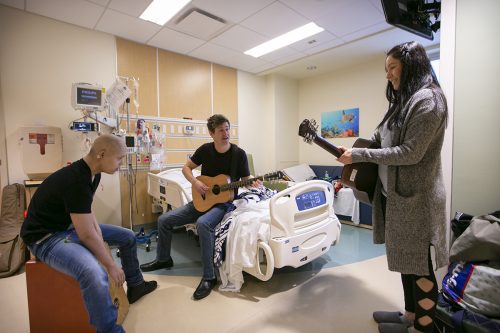
Dr. J Mack Slaughter, center, performs some tunes with Uriel, 15, and his mother, Sara, in Uriel’s room at Children’s Medical Center in Dallas. Photo by Rodger Mallison
Down the hall from the sixth-floor family lounge at Children’s Medical Center Dallas, adjacent to the nurses station with a cupboard marked “Beads of Courage,” Slaughter initiates a new jam session with a teenager named Uriel. The 15-year-old is skilled at the guitar and readily plays for the physician.
“I’m going to lay down a beat, OK?” Slaughter starts, slapping the cajón (a box-shaped percussion instrument) he sits on. He shows Uriel how the instrument works on a four-count, and the two swap places.
“Big wheels keep on turning,” Slaughter starts into Lynyrd Skynyrd’s “Sweet Home Alabama.” Uriel smacks the cajón, PICC lines dangling from his right forearm. The teenager picks up his tempo to match the song’s chorus.
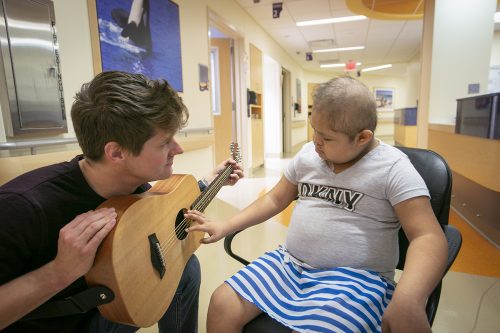
Dr. J Mack Slaughter makes music with Lilianna “Lily,” 10, during a visit to Children’s Medical Center in Dallas. Photo by Rodger Mallison
Still playing, Slaughter looks at Uriel’s mother, Sara Mireles, and asks: “Quieres tocar también?” She joins in for the second chorus.
Accessibility is key for Slaughter, who holds the guitar for young or special-needs patients so they can strum. This is what he does for Lilianna “Lily,” an oncology patient hooked to an IV who watches Slaughter and Uriel’s jam session from the hallway.
“My name is J Mack,” the physician says, squatting down to Lily. “Do you like music?” He shows her how to strum the guitar. “Canción nueva para tí, para Lily,” he says before improvising a song in Spanish using Lily’s name.
Slaughter stops singing and asks 10-year-old Lily to strum. Her eyes lock on the guitar, her body relaxing as she runs her fingers over and over the strings. The patient and the physician become the sole residents in their own world.
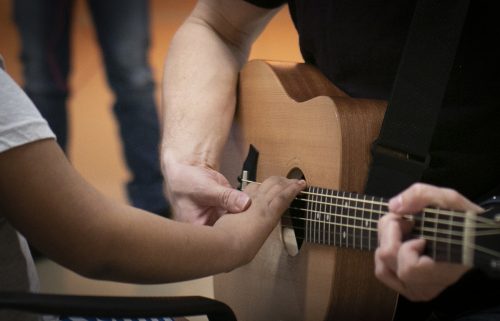
Dr. J Mack Slaughter strums a guitar with Lilianna “Lily,” 10, as part of the physician’s visit with his nonprofit Music Meets Medicine. Photo by Rodger Mallison
Because he doesn’t know the children’s medical details, Slaughter said, he is able to focus on them as people versus patients. “To me, being sick is more than the disease itself,” he said. “The emotional aspect of being ill, the stress response that is elicited by being ill can be curbed, if not reversed, through music.”
In performing through the nonprofit, Slaughter found an unexpected outcome for himself. “It brings the heart back for me,” he said. “It centers me. It brings that pendulum back to the middle. From just intellectualizing the human condition and passing and all that stuff to emotionally experiencing things.”
Physician burnout is a challenge for many doctors, and patients can experience a similar strain. That’s where Slaughter and his organization step in.
“Instead of healing in the micro sense on a cellular level, fighting bacteria and fighting viruses and stuff like that, we’re more focused on healing the spirit — healing the soul.”

Your comments are welcome
Comments
Related reading:
Alumni, Web Extras
TCU Magazine Podcast: Dr. J Mack Slaughter
Dr. J Mack Slaughter ’09 talks about what led him to launch a nonprofit that brings music to chronically ill children.
Features
Dr. Wendy Bonnell Cares for Kids at Ruth’s Place Clinic
The pediatrician considers numerous determinants of health in her practice at the Granbury, Texas, nonprofit.
Alumni, Features
Dr. Alison Lunsford Leads Nonprofit for Diabetic Children
The endocrinologist heads the Diabetic Foundation of the High Plains and runs Camp New Day.